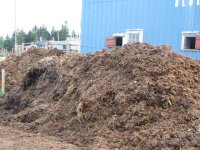WayneB
Elite Member
Jstpssng said:No problem, I found it interesting.
I used to work for a landscaper who was building raised bed gardens for people using composted sewerage sludge. MAYBE it was safe, but the thought curdles my stomach.
I know people around here with huge mounds of horse manure, several years old; I've been talking to them about piling and composting it.
(Gotta be something wrong with someone who finds talk about S***, "interesting."
Well this spring I moved about 55 yards of composted cow manure. It had been in the pile for about three years so it was really nice stuff. Using two tractors a dumping trailer and my pickup to pull it we moved the stuff in about four days, this includes spreading it on all of the gardens.
Little bit early to see what difference it will make in the gardens, but I do know we also added the stuff to the flower gardens and things there are really growing quickly, is it the stuff or warm weather (?)
If it is really old horse manure it will be okay stuff to work with. We have a bunch of that in an upper field, but the one thing I found is that there was a bunch of wood shavings in it and very difficult to compost properly. But, if you have space it is certainly worth hauling it home. A local guy had two horses and was hauling all of his manure up into the pile for more than two years so it is rather large. Haven’t really figured out what we want to do with it. Pumpkins seem to grow pretty good on the pile!
